In October, Apple unveiled the HomePod mini as the first addition to its HomePod lineup since the original full-sized speaker, with the HomePod mini featuring a compact design and the S5 chip.
With a more affordable price tag of just $99, HomePod mini is a much more accessible and versatile HomePod in a compact design. At almost the same time, Amazon released the fourth-generation Amazon Echo with a new design and better sound quality, also for $99.
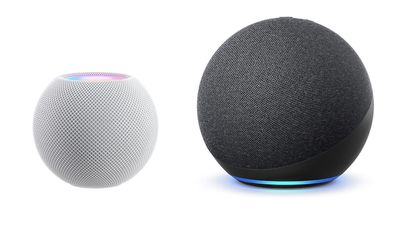
Both the HomePod mini and the Amazon Echo offer good introductions to smart speakers. With the same $99 price tag, should you get the new Amazon Echo or choose the HomePod mini? Our guide outlines the differences between the two smart speakers and helps to answer the question of how to decide which may be best for you.
Comparing the HomePod mini and Amazon Echo
The HomePod mini and Amazon Echo share a number of key features, such as voice controls, stereo-pairing, and multi-room audio:
Similarities
- Spherical design
- Voice control
- Multi-room audio
- Stereo-pair capable
- Stream music with Apple Music, Amazon Music, and Pandora
- Stream radio stations, podcasts, and audiobooks
- Smart home hub
- Hands free calls
- Intercom or household announcements
- Available in grey and white
There are meaningful differences between the HomePod mini and Amazon Echo despite the fact that they share the same price tag, including audio technologies, size, and privacy features:
Differences
HomePod mini
- Compact spherical design
- 3.3 inches tall
- Siri voice control
- Apple S5 processor
- Full-range driver and dual passive radiators for 360-degree sound
- Support for Apple Music, Amazon Music, and Pandora
- U1 chip
Amazon Echo
- Larger spherical design
- 5.24 inches tall
- Alexa voice control
- Amazon AZ1 Neural Edge processor
- 76mm woofer and dual 20mm front-firing tweeters
- Support for Apple Music, Amazon Music, Pandora, Spotify and Deezer
- Temperature sensor
- Microphone Off button to electronically disconnect the microphones
- View, hear or delete voice recordings at any time
- 3mm audio line in and out
Read on for a closer look at each of these aspects, and see what exactly both smart speakers have to offer.
Design
Both the HomePod mini and the fourth-generation Amazon Echo share a similar look, with a spherical design covered in an audio-conductive mesh material. However, the Amazon Echo is much larger at 5.24 inches tall compared to the HomePod mini's 3.3 inches.
The Echo also has a plastic base, a status light around the bottom, and a number of buttons on the top for controlling audio volume and the microphones. The HomePod mini has no buttons, instead opting for a small touch-sensitive display on the top for control and visual cues. It also doesn't have a plastic base like the Echo.
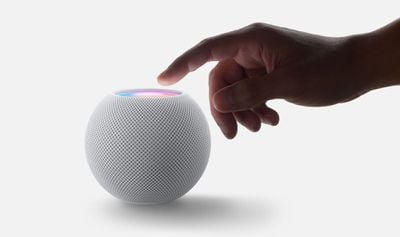 HomePod mini
HomePod miniDesign-wise, it is the size difference and the display or buttons on the top that set the two devices apart. The HomePod mini offers a more interesting and premium look, not least due to its display, but the larger size of the Amazon Echo may make it more appropriate for bigger rooms.
Audio Technology
The HomePod mini boasts a single full-range driver powered by a neodymium magnet and dual passive radiators, enabling deep bass and crisp high frequencies.
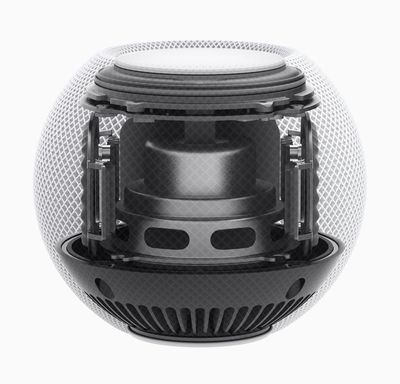 HomePod mini
HomePod miniIt uses an Apple-designed acoustic waveguide to direct the flow of sound down and out toward the bottom of the speaker for a 360-degree audio experience. This allows customers to place the HomePod mini almost anywhere in a room and hear consistent sound.
The Amazon Echo has an upward-firing 76mm woofer and dual 20mm front-firing tweeters. Since the Echo's tweeters face forwards, it is not capable of 360-degree immersive sound, but it is likely to be louder due to its larger size.
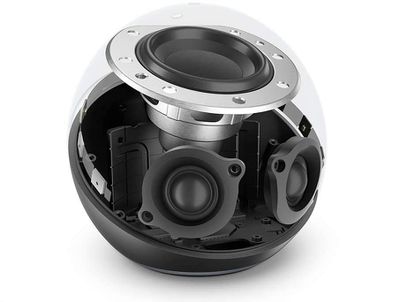 Amazon Echo
Amazon EchoCNBC's Todd Haselton says that the HomePod mini "sounds on a par with Amazon's $50 Amazon Echo Dot but not as good - especially in terms of bass - as the larger $99 Amazon Echo or Google Nest Audio." Similarly, The Verge's Dan Seifert believes that the HomePod mini does not sound as good as the Echo:
The key thing to notice is that the HomePod mini outperforms other "small" smart speakers like the Echo Dot and Nest Mini, but it can't compete with larger speakers like the regular Echo, Nest Audio, or Sonos One. The HomePod mini is priced closer to those larger speakers, although it really belongs in the small speaker class when it comes to the sound it can produce.
The size of the Echo and its larger audio components offer it a substantial advantage when it comes to audio quality, but the HomePod mini should theoretically be more capable of delivering sound across a room due to its ability to project in all directions.
Performance
The HomePod mini uses the S5 chip from the Apple Watch Series 5 and Apple Watch SE. The S5 allows Siri to be swift and responsive, and also performs analysis of audio in real time to apply complex tuning models to optimize loudness, adjust the dynamic range, and control the movement of the driver and passive radiators in real-time.
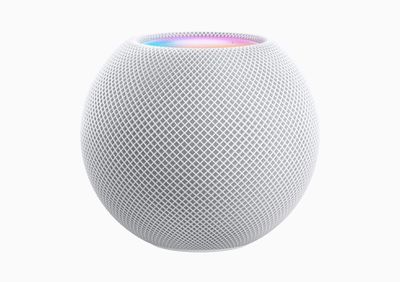 HomePod mini
HomePod miniThe Amazon Echo contains Amazon's AZ1 Neural Edge processor, which is specialized in machine learning. According to Amazon, the processor enables more processing on the device itself and more responsive speech recognition.
It is not straightforward to directly compare the performance of the HomePod mini and Amazon Echo as neither processor can be benchmarked. Regardless, it is safe to assume that both will be well-optimized and adequately responsive to voice commands.
Siri or Alexa
Another key area of difference between the two smart speakers is the voice assistants they have. Both Siri and Alexa are formidable opponents with different areas of strength. Alexa, Amazon's voice assistant, is much more adept at integrating with third-party apps and services.
Siri, Apple's voice assistant, is generally more limited and less capable than Alexa, yet within Apple's ecosystem, it is much more powerful. If you use Apple services, such as Apple Music, HomeKit, or Calendar, you will be able to take advantage of all that Siri has to offer, and will likely have a better experience than with Alexa.
To a large extent, this depends on what ecosystem you are most invested in. If you already use multiple Apple devices and services, the HomePod mini is more likely to offer a streamlined experience. On the other hand, if you use Spotify, which is not directly supported by the HomePod mini, the Echo will offer a much easier way to listen to music using Alexa, rather than AirPlay.
Additional Features
The HomePod mini also contains Apple's U1 ultra-wideband chip. The Apple-designed U1 chip is a proprietary ultra-wideband chip which performs directional and proximity-based operations. The HomePod mini uses the U1 chip to detect when other U1 devices, such as the iPhone 12, are nearby. This allows it to more quickly hand off audio and interact with nearby devices, as well as display relevant information on devices that are close to the HomePod mini.
Beyond this, however, the full potential of U1 in HomePod mini does not yet seem to have been realized. In the future, U1 could facilitate close-range data-transfer, improve AR experiences, and track a user's location within the home. Apple now seems to be adding the U1 chip to all of its new devices, with the chip appearing in the iPhone 12 lineup and the Apple Watch Series 6.
While not quite as intriguing as Apple's U1 ultra-wideband chip, the Echo contains a temperature sensor to aid smart home setups. It is worth noting, however, that the U1 chip will be largely useless without another U1-enabled Apple device for the time being.
Privacy
The HomePod mini and Amazon Echo host a different selection of privacy features. The Amazon Echo has a Microphone Off button that electronically disconnects the microphones. The Echo also allows you to view, hear, or delete all recorded audio at any time.
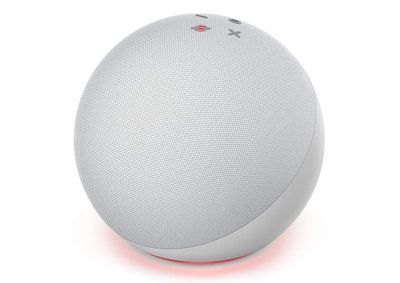 Amazon Echo
Amazon EchoThe HomePod mini has no buttons, and therefore you cannot mute the microphones while it is on. You can, however, disable them using the Home app or simply turn the device off fully.
Apple has a different approach to privacy than Amazon. Amazon's focus is transparency, giving users the ability to listen to their own recordings and delete them, and promote privacy at the user's discretion with a physical mute button.
Instead, Apple ensures that information is only sent to Apple's servers once the "Hey Siri" command is recognized locally on the device. This means that Apple generally only receives specific commands rather than all recorded data.
Moreover, Apple ensures that requests that do reach its servers are anonymized and not associated with any Apple ID, and guarantees that any information gathered is not sold to advertisers or other organizations. The HomePod mini also works with the user's iPhone to complete requests for messages and notes on that device locally without revealing information to Apple.
If you prefer the reassurance of being able to physically press a button to disable microphones or listen back to what has been recorded, then the Echo will be the better choice. While the HomePod mini does not offer either of these features, it does seem to offer better privacy more of the time.
Home Theater Audio
The Echo can be paired with a Fire TV for a "home cinema audio" mode. This enables wireless audio output when watching content on the Fire TV, and allows users to build different wireless speaker configurations, including the ability to stream Dolby wireless audio. The HomePod mini, unlike the larger original HomePod, does not support any home theater functions.
Final Thoughts
To a large extent, choosing between the Amazon Echo and the HomePod mini will be dependent on which ecosystem you are already invested in. If you already use multiple Apple devices and services, the HomePod mini will almost certainly be the better option. Alternatively, if you use a range of third-party devices and services, such as the Fire TV and Spotify, the Echo will offer better support.
It is clear that despite costing the same amount, the HomePod mini and Amazon Echo are targeted at slightly different markets. The HomePod mini is a smaller speaker with lower audio fidelity, intended for smaller rooms or surfaces, while the Amazon Echo can fill a larger space with a higher-quality sound. The smaller Echo Dot is a similar size to the HomePod mini, and the larger HomePod is closer to the standard Amazon Echo. This suggests that overall, the Echo is the better value device.
Ultimately, when choosing between the two rival $99 smart speakers, customers should weigh up how well the device integrates with their existing hardware and services, and what they intend to add to their setup in the future. If that is primarily Apple hardware and services, then the HomePod mini is undoubtedly the best choice. Otherwise, the picture is more mixed and may come down to where you intend to place the smart speaker within the home.

















